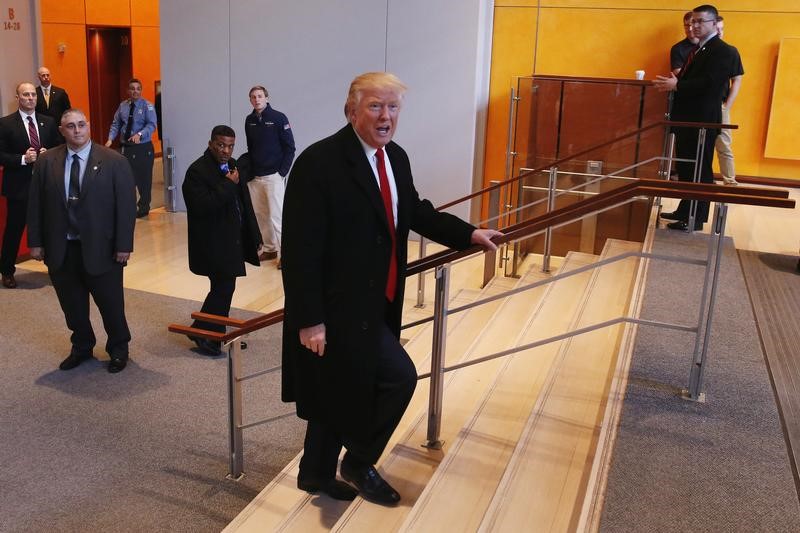By Michael Nienaber
BERLIN (Reuters) - German business morale held steady at a high level in November, suggesting company executives in Europe's largest economy remain upbeat in the face of increased uncertainties following Donald Trump's victory in the U.S. presidential election.
The United States is Germany's most important trading partner and Trump's protectionist rhetoric has unnerved many exporters in the euro zone - an added uncertainty on top of Britain's vote in June to leave the European Union.
The Munich-based Ifo economic institute said on Thursday its business climate index, based on a monthly survey of some 7,000 firms, was unchanged after a slight downward revision to 110.4 from 110.5 previously reported in October.
The November reading compared with a Reuters consensus forecast for a value of 110.5. The October figure was still the highest reading in 2-1/2 years.
"The German economy seems to be unfazed by the election of Donald Trump as U.S. president," Ifo chief Clemens Fuest said. "Confidence in the German economy continues to be good."
German companies were once again more satisfied with their current business situation, but somewhat less optimistic regarding the coming months, the survey showed.
Sentiment in wholesaling and retailing improved sharply while the reading for construction reached a record high. "The construction boom continues," Ifo said in a statement.
Business morale among managers in the manufacturing sector deteriorated, with the institute attributing the decline mainly to less dynamic export prospects.
"If there is a 'Trump effect', it could show up later though - that's what we saw after the Brexit vote," Ifo economist Klaus Wohlrabe told Reuters in an interview.
Q4 REBOUND
Wohlrabe added that Ifo's business climate index suggested the German economy would expand by 0.5 percent in the fourth quarter, bringing full-year growth to 1.9 percent.
The German economy halved its growth rate to 0.2 percent in the third quarter despite rising private consumption and higher state spending as weak foreign trade slowed overall activity, data released earlier on Thursday showed.
Many economists view this cooling as a blip, however, pointing to other sentiment surveys such as Markit's purchasing manager index (PMI) that suggested an economic rebound in the final quarter.
On Monday, Germany's central bank said it expected manufacturing to drive a rebound in growth in October-December. It also said the foundations of growth, namely a vibrant domestic economy, remained intact.
"Since the first Brexit shock, the Ifo index has staged an impressive comeback, suggesting that the summer slowdown of the entire economy was only a blip and not a new trend," ING-Diba economist Carsten Brzeski said.
After the June Brexit vote, the Ifo sentiment reading slipped in July and fell further in August, to 106.3, before rebounding from September.
Brzeski warned, however, that growth was "artificially" inflated by the European Central Bank's record-low interest rates and Berlin's migration-related hike in state spending.
The Ifo index suggested the economy has performed fairly well so far in the fourth quarter, Capital Economics analyst Jack Allen said.
"However, we expect growth to slow next year, putting pressure on the ECB to loosen policy further," Allen added.
The government expects growth to slow to 1.4 percent in 2017, an election year, mainly due to sluggish foreign trade and fewer workdays.
